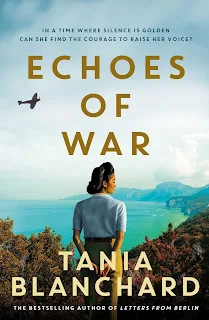* Copy courtesy of Simon & Schuster *
Intro
Guest reviewer Neil Béchervaise is back to share his review of Echoes of War by Australian author Tania Blanchard.Neil's Review
Having focused her earlier novels on events deriving from her father’s German family (see review of Letters from Berlin), Blanchard’s latest work introduces her mother’s Italian heritage.Pre-WWII Calabria is a complex rural setting; a farming community sitting on the edge of a tectonic plate at the toe of Italy, it is severely affected by earthquakes and tsunamis. Its politics are confused between the demands of the local mafia and those of corrupt government officials. More immediately, conflicted memories of WWI and the rising influence of Mussolini’s fascist ideal of a revived Roman empire have been sparked by Italy’s brutal north-African conquest of Abyssinia in 1935.
Echoes of War is a powerful novel about powerful women; women emerging from the archaic traditions of mindless male domination to challenge their assigned status and strive towards more independent futures. Their paths, need it be said, are not easy. Teenaged Giulia enrages her father by insisting on being allowed to study herbal medicine which, despite its trailing connections with witchcraft, is still widely accepted across their community. Younger sister, Paola has a strong sense of purpose in improving the performance of the family farm while their brother and his two best friends join the army and are quickly disenchanted with the brutality of war.
Prevented from running away to join the Red Cross, Giulia is persuaded to spend time in a convent where, it transpires, she can indulge her passion for learning herbal medicine from a highly respected monk. Returning with strong recommendations of her suitability as a healer, and with the support of her mother, aunt and sister, Giulia once more infuriates her father with what he sees as her wilfulness. In a rage he determines that she will be tamed in an arranged marriage to a widowed fisherman, Massimo. Fortunately, Massimo is both amazingly solicitous and patient. He supports her passion for healing and encourages her practice across the community.
As Mussolini joins with Hitler and the war becomes ever more brutal, a massive earthquake and its ensuing tsunami wipe out the coastal fishing town and wartime conditions further impact the community. When their father is recalled into active service, Paola’s business and farming acumen support the family. Giulia’s friendship with her brother’s friend, Stefano, develops with their shared interest in healing. As Stefano, now with the army medical corps and studying medicine, observes:
“…the potential of combining … the ancient and the modern, the knowledge with the practical. Surely that’s best for the patient.” Page 209Prior to the introduction of penicillin and in the absence of formal psychological practice, Giulia and Stefano work together, when they can, to provide meaningful medical assistance in both war damaged towns and in the battle zones of both partisan and military forces.
The role of the Ndrangheta, the Calabrian mafia, as both a criminal organisation and as an anti-fascist political influence suggests a level of stability for a corruption-dogged society which, otherwise, might develop into a modern democracy. As it is presented, however, Blanchard’s apparently loving and supportive Don is shown to be as much a victim of his inheritance as he is a perpetrator of its continuance. Both a powerful humanitarian force and an increasingly influential criminal, his role remains conflicted and his impact on the community remains ambiguous as the population migrates, to America, to Canada, to Australia.
Blanchard’s latest novel is far more recognisable as a history of family than some of her previous works. Its connections between family, religion, and medicine/healing are both engaging and, at times, challenging. Her connection of the region with its ancient Greek and Byzantine roots provides an interesting insight into Mussolini’s obsession with reclaiming ‘lost empire’. More importantly perhaps, it helps to explain the determination of those who remain to restore the stability they have sought since the region, once called Magna Graecia, was settled in the 8th Century BC.
Echoes of War is a powerful evocation of a time, a place and a cultural vision which provided a significant boost to Australia’s population and its development as a multi-cultural destination of choice for refugees – both voluntary and choiceless. In closing, this novel reminds its readers that almost all of us are ‘boat people’.




































